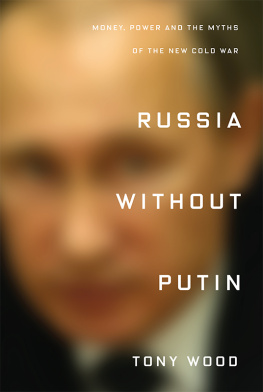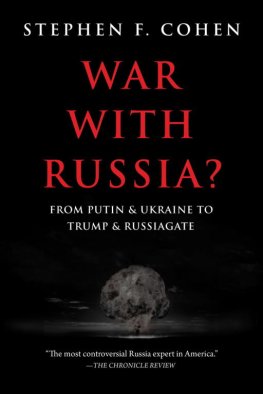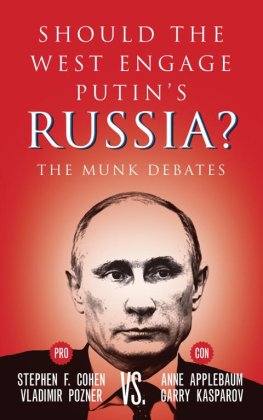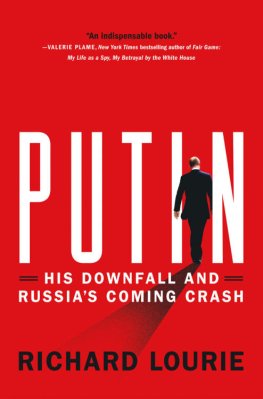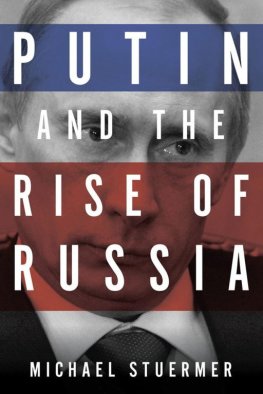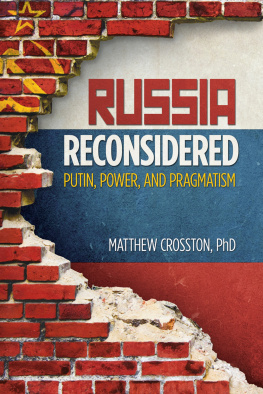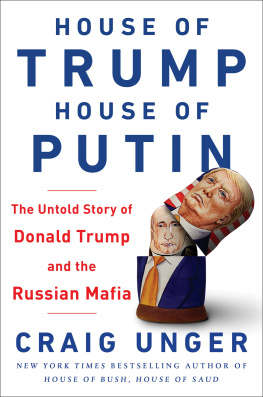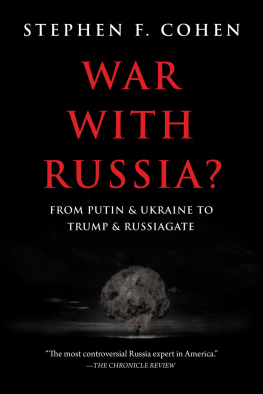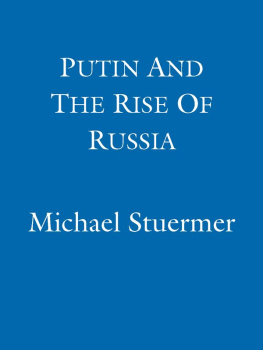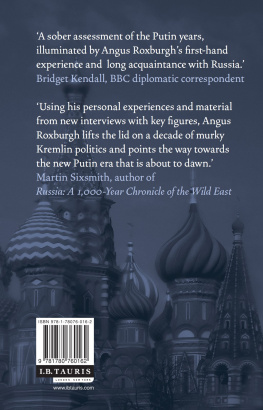Tony Wood - Russia Without Putin: Money, Power and the Myths of the New Cold War
Here you can read online Tony Wood - Russia Without Putin: Money, Power and the Myths of the New Cold War full text of the book (entire story) in english for free. Download pdf and epub, get meaning, cover and reviews about this ebook. year: 2018, publisher: Verso, genre: Politics. Description of the work, (preface) as well as reviews are available. Best literature library LitArk.com created for fans of good reading and offers a wide selection of genres:
Romance novel
Science fiction
Adventure
Detective
Science
History
Home and family
Prose
Art
Politics
Computer
Non-fiction
Religion
Business
Children
Humor
Choose a favorite category and find really read worthwhile books. Enjoy immersion in the world of imagination, feel the emotions of the characters or learn something new for yourself, make an fascinating discovery.
Russia Without Putin: Money, Power and the Myths of the New Cold War: summary, description and annotation
We offer to read an annotation, description, summary or preface (depends on what the author of the book "Russia Without Putin: Money, Power and the Myths of the New Cold War" wrote himself). If you haven't found the necessary information about the book — write in the comments, we will try to find it.
Tony Wood: author's other books
Who wrote Russia Without Putin: Money, Power and the Myths of the New Cold War? Find out the surname, the name of the author of the book and a list of all author's works by series.
Russia Without Putin: Money, Power and the Myths of the New Cold War — read online for free the complete book (whole text) full work
Below is the text of the book, divided by pages. System saving the place of the last page read, allows you to conveniently read the book "Russia Without Putin: Money, Power and the Myths of the New Cold War" online for free, without having to search again every time where you left off. Put a bookmark, and you can go to the page where you finished reading at any time.
Font size:
Interval:
Bookmark:

Money, Power and the Myths
of the New Cold War
Tony Wood

First published by Verso 2018
Tony Wood 2018
All rights reserved
The moral rights of the author have been asserted
1 3 5 7 9 10 8 6 4 2
Verso
UK: 6 Meard Street, London W1F 0EG
US: 20 Jay Street, Suite 1010, Brooklyn, NY 11201
versobooks.com
Verso is the imprint of New Left Books
ISBN-13: 978-1-78873-124-9
ISBN-13: 978-1-78873-537-7 (EXPORT)
ISBN-13: 978-1-78873-126-3 (US EBK)
ISBN-13: 978-1-78873-127-0 (UK EBK)
British Library Cataloguing in Publication Data
A catalogue record for this book is available from the British Library
Library of Congress Cataloging-in-Publication Data
A catalog record for this book is available from the Library of Congress
Typeset in Garamond by Biblichor Ltd, Edinburgh
Printed in the UK by CPI Group (UK) Ltd, Croydon, CR0 4YY
For my parents

I T IS HARD TO THINK of Russia today without thinking of Vladimir Putin. Perhaps more than any other major national leader, he personifies his country in the eyes of the outside world. In Russia itself, he has dominated the political scene for almost two decades with his trademark combination of cool calculation and prickly machismo, his every word beamed daily into homes across the country. And he has proved lastingly popular, sometimes attracting the kind of gushing admiration previously lavished on Communist leaders a latter-day cult of personality expressed in fawning media coverage, kitschy memorabilia, even a brand of vodka. Through three presidential terms and two stints as prime minister, he has enjoyed approval ratings that would be the envy of any world leader. Since he first took office as Yeltsins premier in August 1999, even surveys made by independent pollsters have rarely put him below 70 per cent, and he has largely remained above 80 since the spring of 2014, as tensions with the West have steadily mounted.
In the West, by contrast, perceptions of Putin have become increasingly negative. A drip feed of critical commentary from the mid-2000s onward gathered strength after the Russo-Georgian War of 2008, and turned into a flood with the Ukraine crisis of 201314 and the start of Russias intervention in Syria in 2015. Magazine covers and newspaper headlines, books and TV broadcasts more and more often depicted him as a twenty-first-century tsar, wielding absolute authority over his people. Meanwhile governments and NGOs alike pointed to one damning report after another on the human rights situation or the curtailment of journalistic freedoms in Russia. But this was nothing compared to the storm of vilification that has arisen since the 2016 US presidential elections, as allegations of Russian interference, influence-buying and collusion have dogged the Trump administration through its first year and beyond. Not since the days of Reagan has Russia seemed so central to US political life and not since the depths of the Cold War has it been so unambiguously assumed across most of the political spectrum that Russia is the United States principal enemy.
Yet despite the glaring mismatch between Western condemnation and domestic support, there has been general agreement on at least one thing: the absolute centrality of Vladimir Putin. In the West, Russias president is portrayed as the most implacable foe of the US and its allies, a malevolent puppet master pulling the strings in a succession of crises across the world. In Russia, his supporters see him as inseparable from the fate of the country itself. In October 2014, his deputy chief of staff asserted sycophantically that there is no Russia today if there is no Putin. For his domestic detractors, too, he remains a focal point, though one of anger and frustration. In 201112, protesters dismayed at his impending return to the presidency adopted a slogan that in some ways simply turned the official Kremlin line inside out: Rossiia bez Putina Russia without Putin.
By themselves, these three words might be read as a straight-forward call for regime change. That is not at all the intention of this book. My argument, rather, is that Western media coverage and analysis of Russia are overly fixated on Putins personality. Time and again, the characteristics of the man are used to explain the behaviour or interests of the state. The conflation is to some extent understandable: Russia is a country in which political power is not only highly concentrated but deeply personalized, so the preferences and whims of the figure at the very heart of the system take on an outsized importance. But even in an age when it has become common to analyse complex events through the prism of singular personalities, the recurrent focus on Putin has become particularly extreme. And it is unhelpfully self-confirming: the more media coverage and analysis uses him to explain Russia, the more Putin comes to dominate, constantly narrowing our frame of reference.
Too much attention has been paid to the man, and not enough to the system over which he presides. The obsession with Putins persona effectively reduces a whole range of political, economic and social questions to the swings of one individuals mood or morality. At best, this is highly misleading, distracting us from the broader structural forces that have done so much to shape Russias fortunes in the last few decades. At worst, the focus on Putin is dangerously counter-productive, leading to profoundly mistaken ideas about the source of Russias ills. The notion that a single person is responsible for everything that happens in Russia shades all too readily into the belief that changing the figure at the top will rectify the problem. Putin did not create the system, nor will his removal from the scene alter its fundamental character. In order to understand Russia today, the West needs to shake off its obsession with Putin and look at what lies beyond the Kremlin walls. It needs, in other words, to learn to see Russia without Putin.
At a time when Russia has moved to the centre of public debate in much of the West, it is especially important to have a more informed idea of what the country is actually like. At the height of the Cold War, Western views of the USSR often came packaged in pat formulas about tyranny and freedom, totalitarianism versus democracy. But at least there was a sizeable body of writers, scholars, activists and thinkers who could supply a more nuanced perspective, based on first-hand experience. The Wests levels of expertise and awareness about Russia have, sadly, declined steeply since then, opening the way for all kinds of ill-informed speculation often churned out by individuals with no knowledge of the place, let alone of the people or the language to circulate unchallenged. As a result, public opinion and policy decisions are based on a very shallow understanding of the country.
The purpose of this book is to provide a portrait of contemporary Russia that goes beyond the blaring headlines about its president. How is Russia ruled, and for whose benefit? What are the consequences for Russian society? How can we best explain Russias mounting clashes with the West? Where is the country headed? To answer these questions, we need to discard several of the core assumptions behind most discussions of Putins Russia.
Font size:
Interval:
Bookmark:
Similar books «Russia Without Putin: Money, Power and the Myths of the New Cold War»
Look at similar books to Russia Without Putin: Money, Power and the Myths of the New Cold War. We have selected literature similar in name and meaning in the hope of providing readers with more options to find new, interesting, not yet read works.
Discussion, reviews of the book Russia Without Putin: Money, Power and the Myths of the New Cold War and just readers' own opinions. Leave your comments, write what you think about the work, its meaning or the main characters. Specify what exactly you liked and what you didn't like, and why you think so.

